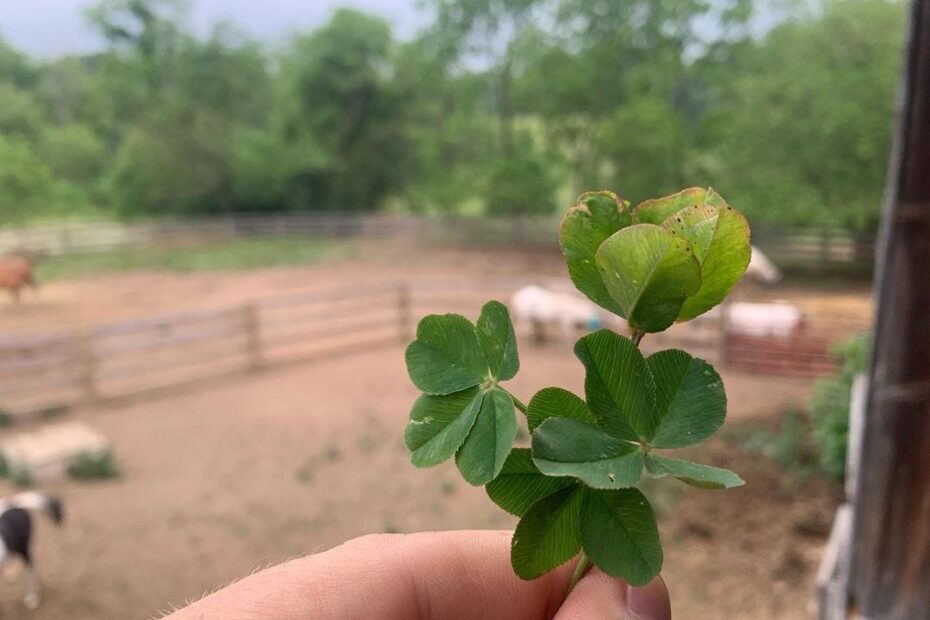Rare Discovery: Giant Four Leaf Clover Found in Local Park
The four-leaf clover, also known as a symbol of good luck, is a rare variation of the common three-leaf clover plant.
Finding a four-leaf clover in a patch of regular three-leaf clovers is considered lucky and is believed to bring blessings and positive energy to the finder. Legend has it that each leaf on the four-leaf clover represents a different virtue: faith, hope, love, and luck. This symbolism has made the four leaf clover a popular choice for charms and amulets, especially in Irish folklore where it is believed to ward off evil spirits and bring prosperity. Despite their rarity, four-leaf clovers can be found in nature, typically occurring once in every 5,000 three-leaf clovers. The genetic mutation that causes the fourth leaf to grow is unpredictable, adding to the allure of these special plants. Many people spend hours searching through patches of clover in hopes of finding a four-leaf clover for themselves. The four-leaf clover’s distinctive appearance makes it easy to identify once found. Its symmetrical shape and the four leaves branching out from a single stem distinguish it from the typical three-leaf variety. People who find a four-leaf clover often press it between the pages of a book or preserve it in a frame as a lucky keepsake. Whether you believe in the magical properties of the four-leaf clover or simply appreciate its unique beauty, coming across one is always a special and fortunate moment.The extra leaf is said to bring good fortune and is highly sought after by many people around the world..
Finding Luck
Luck is often seen as a mysterious force that can bring unexpected good fortune into our lives. But the concept of luck goes beyond just chance and superstition. Finding luck is about creating opportunities and being prepared to seize them when they come your way. One way to increase your chances of finding luck is by staying positive and maintaining a mindset of optimism. This can help attract positive energy and opportunities into your life. Additionally, being open to new experiences and stepping out of your comfort zone can lead to serendipitous encounters and lucky breaks. Luck can also be cultivated through hard work and perseverance. By setting goals, working diligently towards them, and being persistent in the face of challenges, you can create your own luck through your actions and dedication. Remember, luck is not just about chance – it’s about being proactive, positive, and open to possibilities. With the right mindset and effort, you can increase your chances of finding luck in all areas of your life.
Discover the Magic of the Rare Four Leaf Clover!
Four-leaf clovers are a rare variation of the common three-leaf clover, with only about one in 5,000 clovers having four leaves. These elusive plants have captured the imagination of people for centuries, believed to bring good luck and fortune to those who find them. The traditional interpretation of the four leaves is that each leaf represents hope, faith, love, and luck. Finding a four-leaf clover is considered a lucky omen in many cultures around the world. Some believe that carrying a four-leaf clover can ward off evil spirits and bring prosperity. The rarity of the four-leaf clover adds to its mystique, making it a sought-after symbol of good fortune. In folklore, it is said that the Druids of ancient Ireland believed that carrying a four-leaf clover would allow them to see fairies and avoid their mischief.
Whether you believe in the magical properties of the four-leaf clover or simply appreciate its beauty, discovering one in nature is a special moment that connects us to the mysteries of the natural world.Some also believe that the four-leaf clover brings harmony and balance to their lives..
Lucky Charms: Four Leaf Clover Observations
| Aspect | Four Leaf Clover |
|---|---|
| Appearance | Small, green leaves with four leaflets |
| Symbolism | Represents good luck and prosperity |
| Rarity | Rare to find in nature, one in 5,000 clovers |
| Beliefs | Believed to bring good fortune to the finder |
FAQ
FAQ – Four Leaf Clover

Q: What is a four leaf clover?
A: A four leaf clover is a variety of clover that is considered lucky due to its rarity. Instead of the typical three leaves, a four leaf clover has four leaves.
Q: Why are four leaf clovers considered lucky?
A: Four leaf clovers are considered lucky because they are rare and are believed to bring good luck and fortune to those who find them. Each leaf is believed to symbolize something: faith, hope, love, and luck.
Q: How rare are four leaf clovers?
A: Four leaf clovers are very rare, with the odds of finding one estimated to be about 1 in 5,000 clovers. This rarity contributes to their association with luck.
Q: How can I find a four leaf clover?
A: To find a four leaf clover, you can try searching in areas with plenty of clover plants such as grassy fields. Look for clovers with four leaves instead of the usual three. It may take patience and a keen eye to spot one.
Q: Is there any specific way to preserve a four leaf clover?
A: Yes, to preserve a four leaf clover, you can press it between the pages of a heavy book. Leave it undisturbed for a few weeks to allow it to dry out completely. Once dried, you can carefully remove it from the book and place it in a protective covering or frame.
Q: Can I buy four leaf clovers online?
A: Yes, there are online sellers who offer dried four leaf clovers that you can purchase. However, finding a four leaf clover yourself can be more rewarding and meaningful.
Q: Are there any superstitions associated with four leaf clovers?
A: Yes, there are various superstitions associated with four leaf clovers in different cultures. For example, some believe that carrying a four leaf clover will protect you from evil spirits or bring good fortune in love and relationships.
- Cat Palm vs Majesty Palm: Which Should You Choose? - June 30, 2024
- Flowers That Survive Winter: Discover the Exceptional No. 5 - June 30, 2024
- The Ultimate Guide to the Growth and Care of the Black Pagoda Lipstick Plant - June 29, 2024





